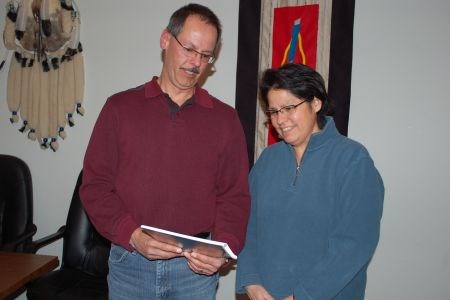A progressive First Nation credits leadership – and location – as key to establishing the entrepreneurial spirit in its members.
“We have more than 40 member-owned businesses,” said Thomas Lambert, economic development officer with Nipissing First Nation.
About 850 members are spread throughout the reserve, which is located between Sturgeon Falls and North Bay. Its total members number 2,300.
The member-owned businesses include retail sales, restaurant services, two construction companies, a fish and meat market, coffee shop and gas bars.
“We encourage our members to establish businesses in commercial areas outside the residential areas,” he said.
Garden Village, just east of Sturgeon Falls and on the shores of Lake Nipissing, is where the administration building is located and where the majority of the members live.
Its land base also parallels Highway 17 which makes it an ideal location to promote businesses. Just west of North Bay, the First Nation established an industrial park several years ago and includes a mix of member and non-member enterprises.
“Our land base is ideal, especially with our neighbouring communities,” Lambert said. “We have the highway which gives us visibility and good transportation links with an airport about half an hour way.”
Non-member tenants in the Couchie Industrial Park include Miller Paving, Miller Waste systems, Carlson Sports and Northern Brick and Tile.
“It creates employment opportunities for our members,” he said. “The benefit of having an industrial park is that larger commercial businesses are kept away from the residential areas but it also creates partnerships and opens the door to many possibilities. We are open for business.”
Lambert also gives the council and administration credit for being proactive and working for the benefit of the community.
“The staff and administration can work as one and we can share ideas,” he said.
That collaboration has resulted in the approval of two small business centres. One will be located in Garden Village and the other will be just off Highway 17, in Yellick, about halfway between North Bay and Sturgeon Falls and near the offices of the Union of Ontario Indians.
The Garden Village business centre is to be completed this summer and ground will be broken for the other one this spring.
Some potential tenants for the Yellick centre have already expressed interest and include a lawyer’s office, the First Nation Statistical Institute (currently operating in Garden Village) and the First Nation’s education department.
“The centres will also offer incubators for those wanting to start their own businesses,” Lambert said. “They will provide opportunities for our members during construction and afterwards.”
The administration is also looking at constructing a fully serviced light commercial business park near the Yellick centre.
For those members who have difficulty obtaining funds to get their businesses off the ground, Nipissing First Nation will be offering a small business loan.
“There is one other First Nation that does that and they have been doing it for 10 years and it works well,” he said. “It may not be a lot of money but it will be a start to get the idea on paper and get a business plan.”
It could also help members who currently have a business to expand or do renovations.
Some of the challenges First Nation entrepreneurs face are the length of the process when applying for funding and waiting for approval.
“It can be frustrating and once approved, the cost of materials and products have gone up so that has to be taken into account,” Lambert said.
Banks are also reluctant to loan money to a First Nation business on First Nation land since property can’t be purchased and owned.
Connie Leslie, who owns a Coffee Time franchise near the industrial park, knows first hand about obtaining funding for a business. She owns the building her business is housed in but not the land. Despite the challenges securing funding, she has been in business for six years.
“We lived in Toronto for 20 years and I wanted to come back home (to Nipissing First Nation),” she said.
Her husband was in the automotive industry and was destined to lose his job and she worked in finance.
“I always came back home for visits and I never really took my roots out,” she said.
Both work at the coffee shop and her husband also has a job outside the business.
“It’s long hours and we only get to go away for a week every six months. But I guess it is successful since we are still open,” she said.




